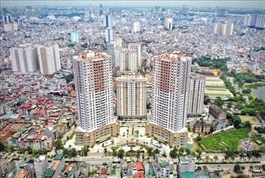Critical juncture set for real estate prospects in 2024
Critical juncture set for real estate prospects in 2024
Despite fluctuations expecting to continue in the Vietnamese real estate market for some months, industry analysts are quietly optimistic that 2024 will mark a turning point for a new cycle of recovery and development.

Currently, both supply and absorption rates continue to decrease sharply compared to 2022, down about 66 per cent. According to Hoang Hai, director of the Department of Housing and Real Estate Market Management under the Ministry of Construction, the biggest issues have involved large gaps in product structure, the short supply of affordable housing, and oversupply in the high-end segment.
“Around 75 per cent of real estate businesses have difficulty accessing capital due to banks tightening lending conditions. Together with a reduced confidence from investors in the market, new capital injections are harder to mobilise,” Hai said.
He added that although the government has approved the new laws on housing and real estate, they will not be fully in operation until 2025. The new land law, meanwhile, is still being considered.
This year the government has implemented a range of solutions to support the market, such as reducing lending interest rates, stabilising the foreign exchange market, promoting disbursement of public investment capital, and implementing stimulus packages.
Especially for the real estate market, a range of solutions were taken such as tax and fee exemptions and reductions, as well as extensions for corporate bond payments.
“Some of these solutions to promote the market have had certain effectiveness. But we have to keep a closer monitor on those difficulties in order to create more suitable solutions to support the market,” Hai said.
Currently, banks are adjusting lending interest rates to create more motivation for investors to participate in the market.
Vo Hong Thang, director of Project Development and Consulting Services under DKRA Group, said that now could be considered appropriate for investors to return.
“One of the most important factors is that in 2023, a series of key public ventures such as urban belt roads, highways, and airports have started construction. The macroeconomy remains stable and inflation is controlled. All of those have a positive impact on helping the real estate market recover and grow again,” Thang said.
Subsequent changes in laws and investments focusing on the actual needs of customers will be the key to sustainable market development in the coming time, said Thang.
“Products that serve real housing needs will recover better. In particular, the affordable apartment segment for the needs of people in the city centre and outskirts areas will recover well, and the land segment will also focus on densely populated areas, with enough amenities and infrastructure,” Thang added.




























